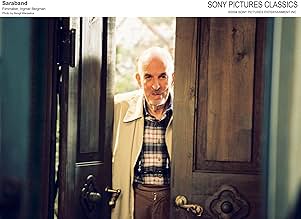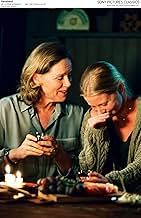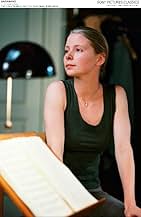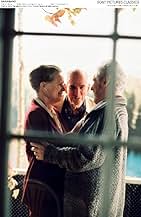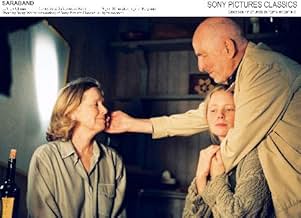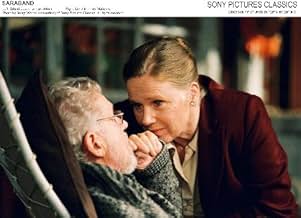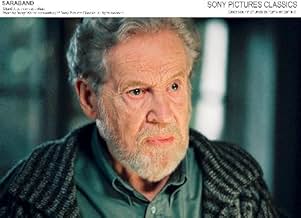Marianne, trent'anni dopo aver divorziato con Johan, decide di visitarlo nella sua casa estiva. Lei arriva proprio nel mezzo di una crisi familiare tra il figlio di Johan - da un altro matri... Leggi tuttoMarianne, trent'anni dopo aver divorziato con Johan, decide di visitarlo nella sua casa estiva. Lei arriva proprio nel mezzo di una crisi familiare tra il figlio di Johan - da un altro matrimonio - e sua moglie.Marianne, trent'anni dopo aver divorziato con Johan, decide di visitarlo nella sua casa estiva. Lei arriva proprio nel mezzo di una crisi familiare tra il figlio di Johan - da un altro matrimonio - e sua moglie.
- Premi
- 3 vittorie e 3 candidature totali
Recensioni in evidenza
Liv Ullman and Erland Josephson, the original screen couple from Bergman's 1973 film Scenes of a Marriage, reunite in his summer home for their first face to face contact since their breakup. Johan has become very wealthy as a result of an inheritance. Marianne is a lawyer and they have two daughters from their failed marriage: Sara who is married to a prominent lawyer and lives in Australia and Martha who is in a mental institution and does not recognize her mother. Johan is surprised by his ex-wife's visit but they still hold hands and try to remember the good things about the past, though Johan's interest seems to be minimal. Living nearby are Henrik (Borje Ahlstedt), Johan's son from a second marriage and his daughter Karin (Julia Dufvenius), a promising young cellist. Henrik and Karin have an uncomfortably strong attachment and mutual need as a result of the recent death of Anna, Henrik's wife who was deeply loved.
Henrik is training his daughter in the cello to prepare her for an audition at the local conservatory but has to turn to Johan for financial support who uses the occasion to humiliate him. Karin is contemplating going to Europe to work for an orchestra but is afraid of the consequences for Henrik if she leaves. Relationships between the family are strained, seemingly beyond repair and their world is filled with childish resentments and regrets. Karin resents her father for suffocating her emotionally. Marianne still resents Johan for his unfaithfulness. Henrik resents his father for -- not being a father. Johan resents Henrik for not being the son he wanted. No one can see beyond their ego to feel the needs and wants of others. The emotional pain is real but I found the end result to be facile and unconvincing.
Saraband has received high praise as a "lacerating examination of life's conundrums that is exhilarating in its fearlessness and its command", and an "affective, touching, and ultimately highly affirming picture of familial turmoil and the curative, as well as destructive, powers of love." But what I ask is this - What new insights do we gain about the human condition from witnessing a family go at each other with unbridled ruthlessness? In offering his audience the latest generation of "emotional illiterates", Bergman lets us see the clawing and fighting but hides the life-affirming reality that people are capable of transcending their limitations.
In Saraband, there is no self- reflection, responsibility, or hint that people can change with the passage of time. His characters only seem to have been able to refine their capacity for collecting grievances. When Henrik is suffering, no one talks about him, goes to visit him, or seems in the least concerned. Is this the way Bergman after all these years sees human relationships? Is this the legacy he wants to leave us? Despite its considerable strengths, Sourband (sic) is a bitter and despairing film that left a bad taste in my mouth.
"Saraband" for me is about as good as he gets...and that's high praise. Here the human soul in anguish is laid bare in all its honest need...a thwarted one...for love and understanding. A once married couple, Marianne and Johann (brilliantly portrayed by Liv Ullmann and Erland Josephson) do their saraband even after 30 years apart. And like that dance, in its repetitive themes, their relationship as well as that of Johann's son and granddaughter form a kind of tragic rondo, sadly and inexorably replicated. Henrik, the 61 year old son (portrayed with amazing profoundity by Borje Ahlstedt) cannot extricate himself from the slings and arrows aimed at him continually by his father. The one character, now dead, who serves as a graceful inspiration to them all is Henrik's wife and his daughter, Karin's mother...Anna. We see her beautiful face in a photographic portrait, but her loving presence in their memory is so strong it becomes a kind of living influence. Karin, played by the stunning Julia Dufvenius, is also the victim of the family dynamic and forms the important fourth in this saraband of life and fate.
If you haven't seen the film, perhaps you should stop reading now.
When we last saw Johan and Marianne they gave the impression their relationship was over. We get to know in "Sarabande" that yes, it really happened, but that a lot of years have passed between the lovers without any actual contact between them. Usually, when intense love affairs end, both partners stay away from one another. It comes as a surprise that Marianne will even try to see Johan after all the intervening years.
When we first meet Johan, he appears to be much older than what he really is. Time has not been kind to him, or so it appears. Marianne, on the other hand is still an interesting woman, who of course, is much younger, but the contrast heightens what appears to be a gulf now between them.
Things are complicated with the introduction of Henrik, Johan's own son, who has moved to a cottage in the property, where he is living with his daughter Karin. Henrik's wife has died, but her picture seems to dominate their lives. In fact, there is something incestuous in the relationship between Henryk and Karin. We watch them in bed, although there's nothing improper about it, but we start to get a different image of what really is going on in the cottage. At one point Karin kisses her father in a way that it confirms the love-hate emotions within Karin's heart. She is trying to break away from this situation in whatever way she can.
In a way we realize that Johan, who seems to hate Henrik, perceives what is going on, but he doesn't have the strength to confront this sad man that is his son. Maryanne, stays away from the feud going on between father and son. It's clear she feels deeply for Karin, a girl that has gained her trust, but there she feels nothing for Henrik.
The acting is first rate, as in most of Mr. Bergman's films. He has the uncanny gift to get great performances from his cast, as it's the case with "Saraband". Liv Ullmann and Erland Josephson are perfect as the one time lovers Marianne and Johan. Borje Ahlstedt makes an unappealing and tormented Henrik. The luminous Julia Dufvenius is marvelous as Karin, the young woman, basically at the center of the story.
This is a great coda for Mr. Bergman. He leaves us with an emotional charged film that will be treasured by all his fans.
Having said that it seems a strange twist of fate to be viewing Saraband, as I did, at the Edinburgh International Film Festival where it is up for the Standard Life 'audience award', along with mainstream crowd-pleasers. As I cast my vote I felt it was almost a desecration for such a movie to be entered in a popularity poll, however discerning the audience. There are a number of serious works at the Festival and they should be judged by an independent panel of experts - there is a discussion afoot to create a new award along these lines - otherwise it is like comparing Beethoven with the Beatles.
Saraband, in true Bergman tradition, wrestles with human relationships, using a slow pace, pointed dialogue, and heavy use of symbolism to explore the psychological states of the characters. Bergman encourages young directors not to direct any film that does not have a "message," but to wait until one comes along that does, yet admits himself that he is not always sure of the message of some of his films.
We are never in any doubt that this film has much point to it, even if the point is not exactly clear. It opens with the slow soulful 'saraband', of Bach's 5th unaccompanied cello suite. 'Sarabande' is one of the movements from the suite, a slow and, compared to the others, a relatively easy piece to play. Marianne (Liv Ullman), is both narrator (at the beginning and end of the film) and principal protagonist. As she walks through the rooms of a house the doors close behind her. A cuckoo clock strikes. She is in the later part of her life. She fleetingly touches the keys of a piano, as if to say she still, even in solitude, has her inner music. Her presence is explained as she goes to the veranda and we find she is visiting an ex-husband, someone who was unfaithful to her many years ago. The colours are crisp and sharp. Of all the members of her family, Marianne is perhaps the clearest of mind and most well-balanced, but it is the extended interaction (with very little action) between the main players that give us insights into the beauty of being elderly, at least for someone like Marianne who handles it well. Yet even she is filled with sadness for others.
Later chapters of the film focus on her step-grand-daughter. Karin is a cellist, living with a rather overprotective (if that's not too mild a word) father, also a musician. She has to face a difficult choice, involving her personal loyalties, her loyalty to herself and ability as a gifted young cellist, and the need to extricate herself from a situation that is bad for her but will be bad for her father if she does.
The symbolism of the title and music neatly metaphors the decisions before her. A saraband is also a two-person dance. The suggestion, made at one point, of playing it by two people alternating is essentially a frivolous one, which serious musicians would probably reject. That the Suite for Unaccompanied Cello should not be played as a duet, even with the younger person playing the 'easier part' as Karin's father suggests, is an unobtrusive symbol reminding us, in the film's later loaded context, that there are some lines that an older and younger person should never cross together.
Saraband shows how old age can tempt us to wisdom or its opposite.
Lo sapevi?
- QuizLast film project directed by Ingmar Bergman.
- BlooperThere are some interesting discrepancies in relation to the time line of the characters. The ages given for the characters are 63 (Marianne), 86 (Johan) and 61 (Henrik). Marianne says that she has not seen Johan for 32 years and that they had been married for 16 years. This means that she married Johan when she was 15 and he was 38. Johan had a falling out with his son when Henrik was 18/19, which must have been after Johan's marriage to Marianne.
- Citazioni
Henrik: Dad, where does all this hostility come from?
Johan: Speak for yourself. When you were 18 or 19, I tried to get close to you. You'd been seriously ill, and your mother wanted us to talk things out. I said to you, "I know I've been a bad father, and I want to do better." And you screamed at me--yes, screamed--"A bad father? You've never been a father at all!" Then you said you could do without my forced exertions. One should respect honest hatred, and I respect yours. But I really couldn't care less if you hate me. You barely exist. If it weren't for Karin, who thank God takes after her mother, you wouldn't exist for me at all. So there's no hostility here, I assure you.
- ConnessioniFeatured in Bergman och filmen, Bergman och teatern, Bergman och Fårö (2004)
- Colonne sonoreCello Suite no. 5 in C Minor, Movement 4: Saraband
Composed by Johann Sebastian Bach
Performed by Torleif Thedeen (as Thorleif Thedeen)
I più visti
- How long is Saraband?Powered by Alexa
Dettagli
- Data di uscita
- Paesi di origine
- Sito ufficiale
- Lingue
- Celebre anche come
- Saraband
- Aziende produttrici
- Vedi altri crediti dell’azienda su IMDbPro
Botteghino
- Lordo Stati Uniti e Canada
- 645.634 USD
- Fine settimana di apertura Stati Uniti e Canada
- 34.304 USD
- 10 lug 2005
- Lordo in tutto il mondo
- 975.181 USD
- Tempo di esecuzione
- 1h 47min(107 min)
- Colore
- Mix di suoni




